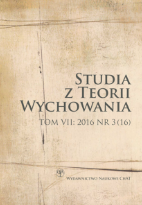Bildung der Sinne
Education of Senses
Author(s): Ewa Przybylska, Ekkehard NuisslSubject(s): Education, Cognitive Psychology, Neuropsychology
Published by: Wydawnictwo Naukowe ChAT
Summary/Abstract: The subject of the article boils down to the issue of sensory perception in the context of cultural education. At the centre of interest there is the question whether and to what extent, cultural education may or should have the aim of supporting the development of individual’s aesthetic competencies. Cultural education is identified by the authors with aesthetic education which forms aestheticism, shapes human personality and supports his ability of self-realisation through arousing his intellectual and emotional creative skills; in other words: competencies of participating in symbolic culture. It is about the sensory perception of the outside world which is simultaneously an internal process guiding a human being in understanding the world and himself. The senses, as the main instruments of cultural and aesthetic development, make the perceiving subject able to act in different social contexts; he is not only able to distinguish beauty from ugliness, but also, and most of all, has an capability of surviving and finding fulfilment in social world as well as actively participating in symbolic culture. The authors refer to synaesthesia phenomenon, that is, simultaneous perception by different senses. There is no object perceived through the senses which would not induce experiences specific for several senses at once. The phenomenon of synaesthesia is another argument for a holistic approach of cultural education to the subject engaged in the act of perception considering all the senses and synaptic connections thanks to which the brain is able to perform cognitive operations as perceiving and thinking. Simultaneously, synaesthesia is a challenge to cultural education. According to the authors, the objective of cultural education is not so much supporting reception of broadly taken products of culture but rather aesthetic sensitizing and sharpening of senses. A decisive power is not attributed to knowledge of artefacts of culture but to the competence of their perception and understanding. Thus the need of education of senses as instruments of perception is a main field of cultural education.
Journal: Studia z Teorii Wychowania
- Issue Year: VII/2016
- Issue No: 3 (16)
- Page Range: 9-25
- Page Count: 17
- Language: German

